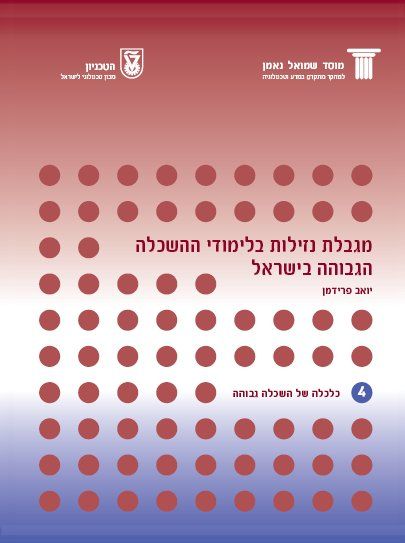עבודה זו בוחנת את השפעת הרקע הכלכלי המשפחתי על סיכוייהם של פרטים המסיימים תיכון לסיים תואר ראשון. העבודה מתבססת על קובץ נתונים ייחודי המשלב ציוני בגרות של פרטים מסיימי יב’ ממחזורים 1992 עד 1997, יחד עם נתונים דמוגרפים וחברתיים של הוריהם ממפקד 1995, וכן אינפורמציה לגבי סיום תואר ראשון של אותם הפרטים עד לשנת 2002. אנו אומדים את ההסתברות של פרט המסיים תיכון לרכוש השכלה גבוהה כפונקציה של נתוני הבגרות האישיים שלו, והרקע המשפחתי. מהרגרסיות עולה כי קיים פער מובהק בהסתברות לסיים תואר ראשון בין פרטים שהוריהם נמצאים באחד מהחמישונים העליונים מבחינת המצב הכלכלי לפרטים עם מאפייני בגרות דומים שהוריהם נמצאים בחמישון התחתון של ההכנסה, פער זה נע במקרים רבים סביב 10 נקודות אחוז ולעיתים אף מעבר לכך. בקרב הזכאים לבגרות במסלול העיוני עיקר הפער בהסתברות לסיים תואר ראשון הוא בין פרטים שהוריהם שייכים לחמישון התחתון מבחינת המצב הכלכלי לפרטים שהוריהם שייכים לאחד משלושת החמישונים הגבוהים. בקרב פרטים שלא היו זכאים לבגרות בעת סיום התיכון נמצא שככל שההורים שייכים לחמישון גבוה יותר מבחינת המצב הכלכלי כך עולה ההסתברות של הפרט לסיים תואר ראשון. התוצאה לגבי הזכאים לבגרות במסלול העיוני תומכת בהשערה כי פרטים שהוריהם שייכים לחמישון התחתון מבחינת המצב הכלכלי סובלים ממגבלת נזילות ולכן נמנעים מלימודים אקדמאים. לעומת זאת, לגבי הלא זכאים לבגרות, שהינם בממוצע בעלי יכולת נמוכה יותר, סביר כי חלק מהפער בהסתברות לסיים תואר ראשון שמקורו במצב הכלכלי של ההורים אינו משקף מגבלת נזילות אלא גורמים נוספים כמו השפעת סביבה ומאמץ להשיג סטאטוס חברתי. כאשר אנו בוחנים את החשיבות היחסית של השפעת המצב הכלכלי של ההורים בהסבר הפער בין אחוז המסיימים לימודים אקדמאיים מקרב הקבוצה החזקה ביותר באוכלוסייה מבחינה כלכלית לקבוצה החלשה ביותר, אנו מוצאים כי המצב הכלכלי של ההורים מסביר פחות מ-20 אחוזים מהפער. שאר הפער מוסבר בעיקר בפערים בהישגים לימודיים קודמים, פערים שנוצרו והתרחבו מהולדת הפרטים ולאורך כל שנות התבגרותם.
 / דוחות ומחקרים / מגבלת נזילות בלימודי ההשכלה הגבוהה בישראל
/ דוחות ומחקרים / מגבלת נזילות בלימודי ההשכלה הגבוהה בישראל











